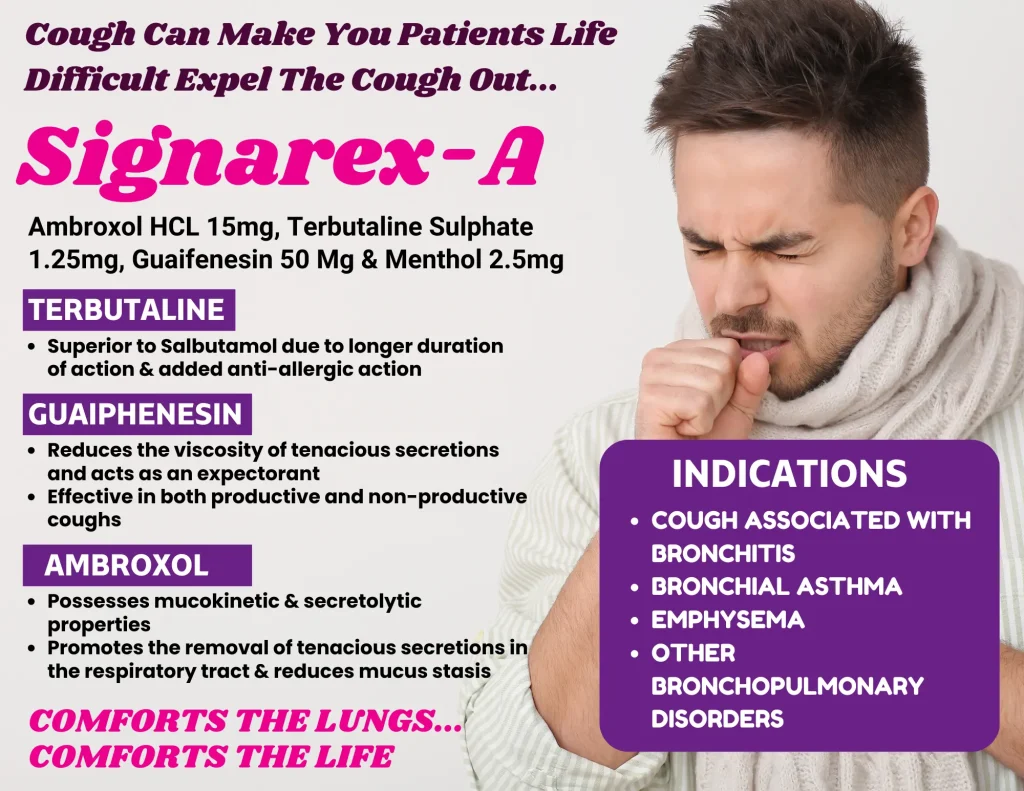- For PCD: +91 84274 44669, For API: +91 9888000708
- For PCD: pankaj@signaindia.com, For API: atul@signaindia.com
- E 56, Industrial Area, Phase 8, Mohali, Punjab, India

Coughs and colds are among the most common ailments, often causing significant discomfort and disruption to daily life. While these conditions are usually not serious, they can be particularly bothersome, leading people to seek effective treatment options. Anti cold cough syrups are a popular solution, offering relief from symptoms such as congestion, coughing, and throat irritation. This guide delves into the specifics of one such syrup, containing Ambroxol HCL, Terbutaline Sulphate, Guaifenesin, and Menthol, explaining how it works and why it might be the right choice for you.
Anti cold cough syrup is a medicinal solution designed to alleviate the symptoms associated with colds and coughs. It combines multiple active ingredients to target different aspects of these conditions, providing comprehensive relief. These syrups work by loosening mucus, opening airways, and soothing irritated throats, making it easier to breathe and reducing the frequency and severity of coughs.
Cold and cough symptoms can range from mild to severe and often include a runny or blocked nose, sore throat, coughing, sneezing, and general fatigue. These symptoms can significantly impact daily activities, making it hard to work, sleep, or even enjoy leisure time. Effective treatment is essential to manage these symptoms and maintain quality of life.
Ambroxol HCL is a mucolytic agent, which means it helps break down and thin mucus in the airways. This action makes it easier to cough up and clear mucus, providing relief from chest congestion.
Ambroxol stimulates the production of surfactant, a substance that helps reduce the stickiness of mucus. This action facilitates the clearance of mucus from the respiratory tract, improving breathing and reducing coughing.
Ambroxol HCL is highly effective in treating conditions involving excessive mucus production, such as bronchitis and chronic obstructive pulmonary disease (COPD). It provides quick relief from congestion and promotes easier breathing.
Terbutaline Sulphate is a bronchodilator, a medication that helps relax and open the air passages in the lungs. It is commonly used to treat asthma, bronchitis, and other breathing disorders.
Terbutaline works by stimulating beta-2 receptors in the lungs, leading to the relaxation of bronchial muscles. This action opens the airways, making it easier to breathe and reducing wheezing and shortness of breath.
Terbutaline Sulphate is effective in providing quick relief from bronchospasm and improving airflow in the lungs. It is particularly useful in managing acute asthma attacks and chronic respiratory conditions.
Guaifenesin is an expectorant, a type of medication that helps clear mucus from the respiratory tract. It is commonly used to treat chest congestion and improve breathing.
Guaifenesin acts by increasing the volume and decreasing the viscosity of the mucus in the airways. This action makes it easier to cough up and expel mucus, clearing the respiratory passages.
Guaifenesin is effective in relieving chest congestion and improving the productivity of coughs. It helps clear mucus, making breathing easier and reducing the discomfort associated with colds and respiratory infections.
Menthol is a natural compound with cooling and soothing properties. It is commonly used in cough syrups, lozenges, and topical treatments to provide relief from irritation and pain.
Menthol works by activating cold-sensitive receptors in the skin and mucous membranes. This action produces a cooling sensation that helps soothe irritated throats and reduces the urge to cough.
Menthol gives immediate relief from throat discomfort and reduces coughing. Its soothing properties make it a valuable addition to cough syrups, enhancing their overall effectiveness.
The combination of Ambroxol HCL, Terbutaline Sulphate, Guaifenesin, and Menthol offers a multi-faceted approach to treating cold and cough symptoms. Each ingredient targets different aspects of the condition, providing comprehensive relief.

This combination works synergistically to address the full spectrum of cold and cough symptoms, from congestion and mucus buildup to throat irritation and breathing difficulties.
Anti cold cough syrup is ideal for individuals experiencing symptoms of the common cold, chest congestion, and coughs. It is particularly beneficial for those who need a multi-symptom relief solution. However, it is important to consult a healthcare provider to ensure it is appropriate for your specific condition and to avoid any potential interactions with other medications.
The suggested dose varies according on age, weight, and severity of symptoms. Always follow the instructions on the package or from your healthcare provider.
Take the syrup with a full glass of water to help loosen mucus. For best results, use a proper measuring device to ensure accurate dosing. Avoid consuming dairy products immediately before or after taking the syrup, as they can increase mucus production.
Serious side effects are rare but can include allergic reactions, difficulty breathing, and severe dizziness. If you encounter any of these symptoms, seek medical attention right once.
Avoid using this syrup if you have a known allergy to any of its ingredients. Additionally, individuals with severe heart problems, high blood pressure, or thyroid disorders should consult a healthcare provider before use.
This syrup can interact with certain medications, including beta-blockers, diuretics, and other respiratory drugs. To avoid potential interactions, always inform your healthcare professional about all medications you are currently taking.
Anti cold cough syrups are highly effective in providing multi-symptom relief compared to single-ingredient treatments. They offer a comprehensive approach to managing cold and cough symptoms.
While anti cold cough syrups can cause side effects, they are generally well-tolerated when used as directed. Other treatments, such as decongestants and antihistamines, may have different side effect profiles.
Many patients prefer anti cold cough syrups due to their ease of use and the immediate relief they provide. Syrups can be more palatable and easier to administer compared to pills or capsules.
A doctor can provide a more accurate diagnosis, prescribe stronger medications, or recommend additional treatments such as inhalers or antibiotics if a bacterial infection is present.
Anti cold cough syrups containing Ambroxol HCL, Terbutaline Sulphate, Guaifenesin, and Menthol offer effective relief from a wide range of cold and cough symptoms. By understanding how these ingredients work and how to use the syrup properly, you can manage your symptoms more effectively and get back to your daily activities sooner. Always consult with a healthcare professional to ensure this medication is right for you.